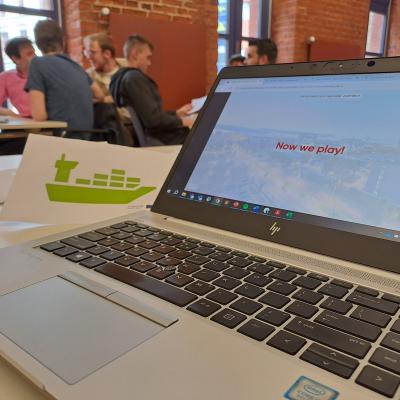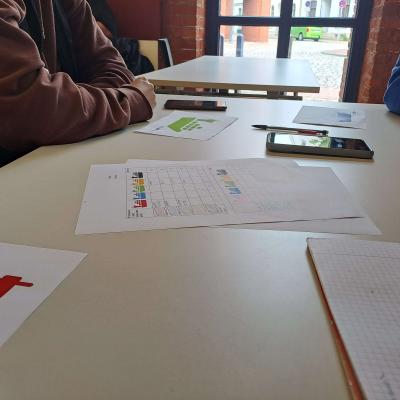In today's globalized world, collaboration in logistics is crucial. The collaborative container transport game simulates five container transport companies moving containers from Antwerp to Rotterdam, aiming to reduce costs by sharing resources. Players must navigate challenges such as deciding whom to collaborate with, how much information to share with competitors, and determining cost-sharing arrangements. The game provides its players with insights into the complexities of modern logistics, the effects of information sharing, cost-sharing methods, perceptions of fairness, and challenges in negotiating and collaborating.
This serious game was developed by Dr. Layla Martin (TU Eindhoven) and financed as part of the Interreg North Sea InnoWaTr project. The project's international relationships were leveraged to organize test-runs to validate the game, with Bremenports eventually establishing contact with the University of Applied Sciences Bremerhaven and Sabrina Wilms (Bremenports, International Projects) providing on-site support. Bremerhaven’s Professor Dr. Oliver Norkus gladly accepted the offer, accompanied by colleagues Gabriele Rüscher (Logistics Lab) and Nadine Metzler (Press Office). After a short welcome by Dean Prof. Dr. Gerhard Feldmeier, 17 students from the second semester of the “Transportation/Logistics” program, study course “Operations Research,” took on the challenge of mastering the game.
Overall, the game highlights the various ways knowledge can be imparted, with serious games offering a valuable option to engage future logisticians in important topics. The collaborative approach, particularly relevant to InnoWaTr, was emphasized in the game's second round. Students were encouraged to make decisions under time pressure, emphasizing the importance of communication in finding optimal solutions in logistics.
The students highlighted the difficulties in negotiating prices, particularly if some other players were offering low rates. They also learned how important collaboration is, and how easy it can be to manipulate others (or be manipulated). Additionally, they noted the game's great applicability. These statements underline Prof. Dr. Oliver Norkus' motivation for agreeing to this exchange: “Dealing with analytical decision-making processes is essential for students nowadays. The interactive game enables students to actively engage with planning variables and planning processes and to evaluate complex scenarios in a realistic environment. In this sense, it is great preparation for later professional life."
Layla Martin and Sabrina Wilms would like to express their gratitude to the University of Applied Sciences Bremerhaven for hosting them and allowing them to conduct the serious game.




